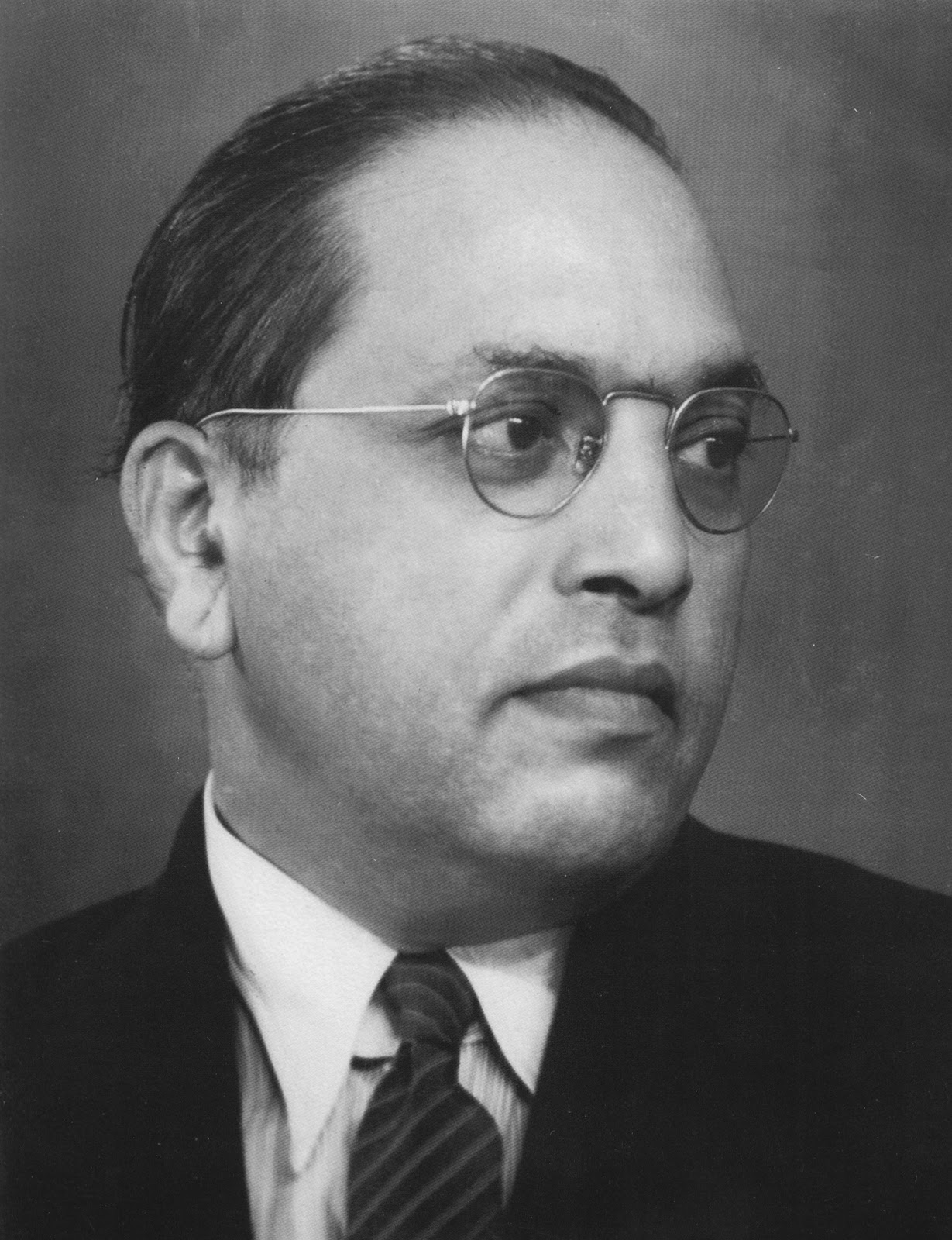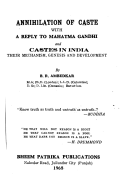“In Hinduism, conscience, reason, and independent thinking have no scope for development.”
Political Science for Civil Services Main Examination (2010)
Bhimrao Ramji Ambedkar , also known as Babasaheb Ambedkar, was an Indian jurist, economist, politician and social reformer who inspired the Dalit Buddhist movement and campaigned against social discrimination towards the untouchables . He was independent India's first law and justice minister, the major architect of the Constitution of India.
Ambedkar was a prolific student, earning doctorates in economics from both Columbia University and the London School of Economics, and gained a reputation as a scholar for his research in law, economics and political science. In his early career he was an economist, professor, and lawyer. His later life was marked by his political activities; he became involved in campaigning and negotiations for India's independence, publishing journals, advocating political rights and social freedom for Dalits, and contributing significantly to the establishment of the state of India. In 1956 he converted to Buddhism, initiating mass conversions of Dalits.In 1990, the Bharat Ratna, India's highest civilian award, was posthumously conferred upon Ambedkar. Ambedkar's legacy includes numerous memorials and depictions in popular culture.
Wikipedia

“In Hinduism, conscience, reason, and independent thinking have no scope for development.”
Political Science for Civil Services Main Examination (2010)
Political Science for Civil Services Main Examination (2010)
295-296
Pakistan or The Partition of India (1946)
Source: Pakistan or The Partition of India (1946), pp. 330-331
As quoted in http://www.columbia.edu/itc/mealac/pritchett/00ambedkar/txt_ambedkar_salvation.html
“Caste is not just a division of labour, it is a division of labourers.”
As quoted in The Annihilation of Caste http://ccnmtl.columbia.edu/projects/mmt/ambedkar/web/section_4.html
Quoted in Dhananjay Keer: Ambedkar, p.498. (Dr. Ambedkar, Life and Mission. Popular Prakashan, Bombay 1987 (1962).)
Speech delivered to the Bombay Presidency Mahar Conference (31 May 1936) http://www.columbia.edu/itc/mealac/pritchett/00ambedkar/txt_ambedkar_salvation.html
Political Science for Civil Services Main Examination (2010)
"The Decline and Fall of Buddhism", in Dr. Babasaheb Ambedkar: Writings and Speeches, Vol. III (1987), Government of Maharashtra, p. 238
228-230
Pakistan or The Partition of India (1946)
294
Pakistan or The Partition of India (1946)
Radical Equality: Ambedkar, Gandhi, and the Risk of Democracy https://books.google.co.in/books?id=K3c-CQAAQBAJ&pg=PA303&lpg=PA303&dq=Religion+must+mainly+be+a+matter+of+principles+only.+It+cannot+be+a+matter+of+rules.+The+moment+it+degenerates+into+rules,+it+ceases+to+be+a+religion,&source=bl&ots=Z580zN8EaN&sig=pw39zHdZTHfmGbLTLRRVLNX-WwA&hl=en&sa=X&ved=0CC4Q6AEwA2oVChMIxLm9qfeSyAIViAuOCh2Phg9p#v=onepage&q=Religion%20must%20mainly%20be%20a%20matter%20of%20principles%20only.%20It%20cannot%20be%20a%20matter%20of%20rules.%20The%20moment%20it%20degenerates%20into%20rules%2C%20it%20ceases%20to%20be%20a%20religion%2C&f=false
Political Science for Civil Services Main Examination (2010)
"The Decline and Fall of Buddhism", in Dr. Babasaheb Ambedkar: Writings and Speeches, Vol. III (1987), Government of Maharashtra, p. 229-388
In an ""Why I like Buddhism and how it is useful to the world in its present circumstances" BBC (May 1956) http://www.ambedkar.org/Babasaheb/Why.htm
"The Decline and Fall of Buddhism", in Dr. Babasaheb Ambedkar: Writings and Speeches, Vol. III (1987), Government of Maharashtra, p. 229 https://books.google.com/books?id=18W1AAAAIAAJ&q=%22the+mission+to+destroy+Buddhism.+Islam+destroyed+Buddhism+not+only+in+India+but+%22&dq=%22the+mission+to+destroy+Buddhism.+Islam+destroyed+Buddhism+not+only+in+India+but+%22&hl=en&sa=X&ved=0ahUKEwiCrd-YwL7LAhUGbj4KHVa2DekQ6AEIIzAB
Source: Pakistan or The Partition of India (1946), Chapter 7
“Indifferentism is the worst kind of disease that can affect people.”
Political Science for Civil Services Main Examination (2010)
Pakistan or The Partition of India (1946)
Context: The third thing that is noticeable is the adoption by the Muslims of the gangster's method in politics. The riots are a sufficient indication that gangsterism has become a settled part of their strategy in politics. They seem to be consciously and deliberately imitating the Sudeten Germans in the means employed by them against the Czechs. So long as the Muslims were the aggressors, the Hindus were passive, and in the conflict they suffered more than the Muslims did. But this is no longer true. The Hindus have learned to retaliate and no longer feel any compunction in knifing a Musalman. This spirit of retaliation bids fair to produce the ugly spectacle of gangsterism against gangsterism.
How to meet this problem must exercise the minds of all concerned. (p. 269)
“I measure the progress of a community by the degree of progress which women have achieved.”
As quoted in The Ultimate Book of Quotations by Joseph Demakis, p. 415 https://books.google.co.in/books?id=kOnjAwAAQBAJ&pg=PA415&lpg=PA415&dq=%22I+measure+the+progress+of+a+community+by+the+degree+of+progress+which+women+have+achieved.%22&source=bl&ots=6Sioo741pq&sig=noA7WLMLys1qWi5_CHIYKkWg9j0&hl=en&sa=X&ved=0CDQQ6AEwBGoVChMIzc7x1feSyAIVRhmOCh24BAME#v=onepage&q=%22I%20measure%20the%20progress%20of%20a%20community%20by%20the%20degree%20of%20progress%20which%20women%20have%20achieved.%22&f=false
As quoted in Book Of Happiness, by Jagdish Gupta https://books.google.co.in/books?id=H7cwBQAAQBAJ&pg=PA101&lpg=PA101&dq=Unlike+a+drop+of+water+which+loses+its+identity+when+it+joins+the+ocean,+man+does+not+lose+his+being+in+the+society+in+which+he+lives.+Man%27s+life+is+i&source=bl&ots=eVeEf_7dR3&sig=88DaiaoPeTdFtzRM73yLcZmasVg&hl=en&sa=X&ved=0CEMQ6AEwB2oVChMIh7H05PiSyAIVRNSOCh2zIABs#v=onepage&q=Unlike%20a%20drop%20of%20water%20which%20loses%20its%20identity%20when%20it%20joins%20the%20ocean%2C%20man%20does%20not%20lose%20his%20being%20in%20the%20society%20in%20which%20he%20lives.%20Man%27s%20life%20is%20i&f=false
Variant: Unlike a drop of water which loses its identity when it joins the ocean, man does not lose his being in the society in which he lives. Man's life is independent. He is born not for the development of the society alone, but for the development of his self.
Source: Pakistan or The Partition of India (1946), pp. 65
Source: Pakistan or The Partition of India (1946), p. 236
Political Science for Civil Services Main Examination (2010)
Source: Pakistan or The Partition of India (1946), p. 233
Political Science for Civil Services Main Examination (2010)
Political Science for Civil Services Main Examination (2010)
Variant: History shows that where ethics and economics come in conflict, victory is always with economics. Vested interests have never been known to have willingly divested themselves unless there was sufficient force to compel them.
Source: Pakistan or The Partition of India (1946), p. 157
Political Science for Civil Services Main Examination (2010)
“Every progress has its bill of costs and only those who pay for it will have that progress.”
Dr. Babasaheb Ambedkar in the Bombay Legislature https://archive.org/stream/Ambedkar_CompleteWorks/13A.%20Dr.%20Ambedkar%20in%20the%20Bombay%20Legislature%20PART%20I_djvu.txt
“Equality may be a fiction but nonetheless one must accept it as governing principle.”
Political Science for Civil Services Main Examination (2010)
“I was born a Hindu because I had no control over this, but I shall not die a Hindu.”
Political Science for Civil Services Main Examination (2010)
“I was born a Hindu but will not die one.”
As quoted in "The bogey of forced conversions", in The Hindu (26 October 2008) http://www.hindu.com/mag/2008/10/26/stories/2008102650150500.htm
Speech delivered to the Bombay Presidency Mahar Conference (31 May 1936)
“A great man is different from an eminent one in that he is ready to be servant of the society.”
Political Science for Civil Services Main Examination (2010)
Source: Pakistan or The Partition of India (1946), p. 301
“If I find the constitution being misused, I shall be the first to burn it.”
Political Science for Civil Services Main Examination (2010)
Source: Pakistan or The Partition of India (1946), p. 228
Source: Pakistan or The Partition of India (1946), pp. 330-331
Political Science for Civil Services Main Examination (2010)
quoted in Dhanajay Keer: 'Dr Ambedkar: Life and Mission', p.279).
As recorded in the, Writings and Speeches Vol 15 page 582 of BAWS. https://www.mea.gov.in/Images/attach/amb/Volume_15.pdf
Political Science for Civil Services Main Examination (2010)
Pakistan or The Partition of India (1946)
Pakistan or The Partition of India (1946)
Pakistan or The Partition of India (1946)
Pakistan or The Partition of India (1946)
Pakistan or The Partition of India (1946)
Pakistan or The Partition of India (1946)
Pakistan or The Partition of India (1946)
Source: Pakistan or The Partition of India (1946), p. 186-7
Source: Pakistan or The Partition of India (1946), Chapter 7
Who were the Shudras? (1946)
Who were the Shudras? (1946)
Who were the Shudras? (1946)
Who were the Shudras? (1946)
“The Brahmin of Panjab is racially of the same stock as the Chamar of Punjab.”
... "Caste system does not demarcate racial division. Caste system is a social division of people of the same race.
Annihilation of Caste. See p.49 of his Writings and Speeches, vol.1, Education Dpt., Government of Maharashtra 1979. Quoted from Elst, Koenraad (1991). Ayodhya and after: Issues before Hindu society.
“The history of India is a history of mortal conflict between Buddhism and Brahmanism.”
As quoted in The Radical in Ambedkar: Critical Reflections
As quoted in http://www.columbia.edu/itc/mealac/pritchett/00ambedkar/txt_ambedkar_salvation.html
As quoted in http://www.columbia.edu/itc/mealac/pritchett/00ambedkar/txt_ambedkar_salvation.html
As quoted in http://www.columbia.edu/itc/mealac/pritchett/00ambedkar/txt_ambedkar_salvation.html
As quoted in http://www.columbia.edu/itc/mealac/pritchett/00ambedkar/txt_ambedkar_salvation.html
quoted in Annihilation of Caste
On Communism, Thoughts of Dr. Baba Saheb Ambedkar https://books.google.com/books?id=6nolAQAAIAAJ, p. 107
